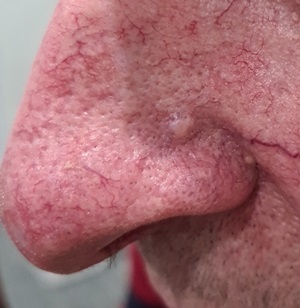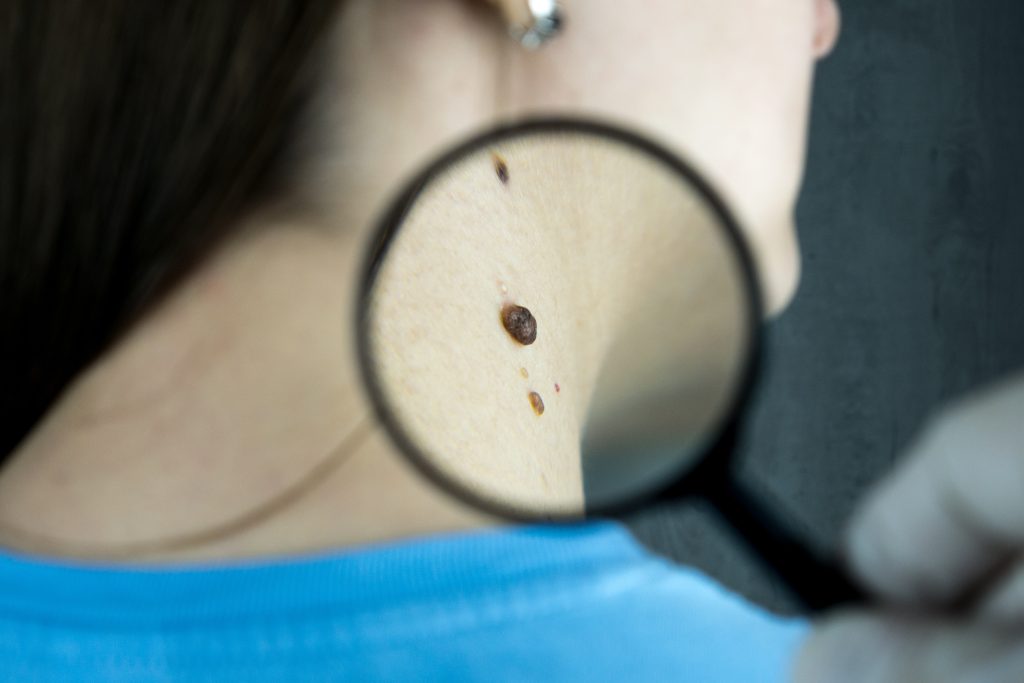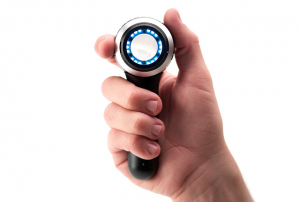What is Basal Cell Carcinoma (BCC)?
Basal Cell Carcinoma is the most prevalent type of skin cancer, originating in the basal cells, which are found in the deepest layer of the epidermis. While it is generally slow-growing and seldom spreads to other parts of the body, early detection and treatment are crucial to avoid disfigurement

What does Basal Cell Carcinoma look like?
BCC can manifest in various forms, but common characteristics include:
- Shiny Bump: Often presents as a pearly or waxy bump.
- Pink Patch: May appear as a pinkish patch of skin that doesn’t heal.
- Open Sore: Some BCCs can develop into an open sore that oozes, crusts, or recurrently bleeds.
Risk Factors for Developing Basal Cell Carcinoma:
Several factors increase the risk of developing BCC:
- UV Exposure: Prolonged exposure to the sun’s ultraviolet rays, especially without protection, is a primary risk factor.
- Fair Skin: Individuals with fair skin, light hair, and light-colored eyes are more susceptible.
- History of Sunburns: Those who have experienced severe sunburns, particularly during childhood, face an elevated risk.
- Age: BCC is more common in older individuals, though it can affect people of any age.
- Personal or Family History: If you or a close family member has had BCC before, the risk increases.
- Weakened Immune System: Conditions or medications that suppress the immune system can contribute.

How can Basal Cell Carcinoma be Treated?
Treatment options depend on the size, location, and type of BCC. Common approaches include:
- Surgical Excision: The vast majority of BCCs are excised with a small ellipse under local anaesthetic.
- Margin Controlled Surgery: A specialized surgical technique, particularly useful in high sensitive or high risk areas, involving the removal of thin layers of tissue until no cancer cells remain.
- Cryotherapy and Curettage : Repeat freezing and scraping the cancer cells using liquid nitrogen and a sharp curette. Suitable for some superficial BCCs.
- Topical Medications: Imiquimod (Aldara™) is a prescription cream that activates the immune system to destroy the cancer cells. Suitable for some superficial BCCs.
- Photodynamic Therapy (PDT): Using a light source to activate a medication that selectively destroys cancer cells. Suitable for some superficial BCCs.
It’s important to note that early detection plays a vital role in successful treatment outcomes. Regular skin checks, especially for individuals with risk factors, can facilitate the identification of BCC at an early, more treatable stage.
Preventive Measures:
- Sunscreen: Regularly use sunscreen with SPF 50+, and apply it generously, especially on exposed skin.
- Protective Clothing: Wear hats, sunglasses, and long-sleeved clothing for added sun protection.
- Sun Avoidance: Limit sun exposure during peak hours (10 a.m. to 4 p.m.).
- Regular Skin Checks: Conduct self-examinations and seek professional dermatological examinations for any suspicious changes.
Remember, consulting with a skin cancer doctor for an accurate diagnosis and appropriate treatment plan is crucial if you suspect or notice any unusual changes in your skin.


